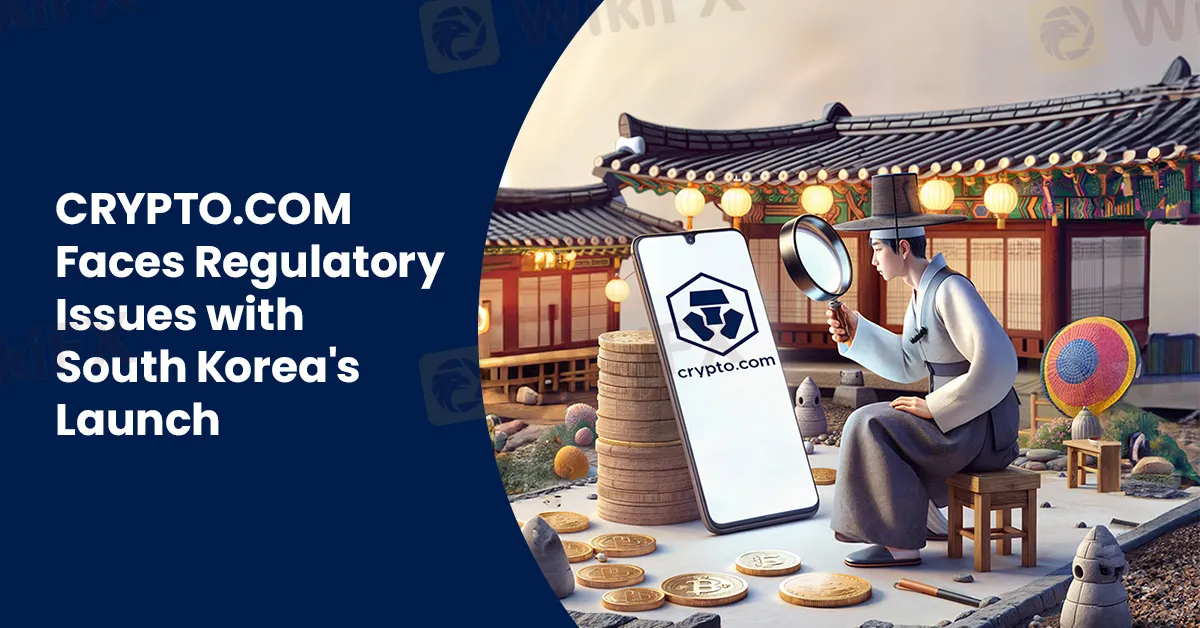简体中文
繁體中文
English
Pусский
日本語
ภาษาไทย
Tiếng Việt
Bahasa Indonesia
Español
हिन्दी
Filippiiniläinen
Français
Deutsch
Português
Türkçe
한국어
العربية
Crypto.com Faces Regulatory Issues with South Korea's Launch
Abstract:Crypto.com's decision to delay the launch of its app in South Korea due to regulatory concerns regarding anti-money laundering practices has prompted an urgent on-site inspection by Korean financial authorities.

Crypto.com has decided to delay the launch of its app in South Korea, citing regulatory concerns over the exchange's anti-money laundering practices as the primary reason. A report by local media outlet Segye Ilbo indicates that Korean financial authorities have commenced an urgent on-site inspection of the crypto exchange.
The inspection, led by the Financial Intelligence Unit under the Financial Services Commission, was prompted by concerns related to anti-money laundering practices found in the data submitted by Crypto.com.
While emphasizing its commitment to upholding rigorous anti-money laundering standards, Crypto.com asserts that it adheres to the “highest” standards. However, it has opted to postpone the launch of its new service to ensure that Korean regulators are thoroughly informed about its policies, procedures, systems, and controls.

Originally, the exchange had announced plans to roll out a local mobile application for coin trading next week, promising competitive pricing and support for various virtual asset transactions. Despite obtaining approvals to operate in South Korea in 2022, Crypto.com has encountered regulatory obstacles in the country.
Earlier this month, Crypto.com had announced its intention to introduce the new app in South Korea, characterizing it as a specialized trading platform tailored specifically for the Korean market. Eric Anziani, the Chief Operating Officer of Crypto.com, emphasized Korea's tech-savvy population and its penchant for innovation as pivotal factors guiding this decision.
Anziani elaborated on the upcoming launch, mentioning that the first product Crypto.com will introduce in Korea is the crypto.com app, which is their most popular product globally. He described it as a fully mobile product offering a convenient and safe way to buy, sell, and store digital assets, including non-fungible tokens, enabling Korean customers to access global prices in a regulated manner.
Furthermore, Crypto.com aims to support Korean creators and artists through potential partnerships, leveraging the country's influential status as a cultural hub. In ongoing discussions with local banks, Crypto.com is seeking to establish partnerships for account authentication, a regulatory prerequisite in Korea.
At present, the Korean cryptocurrency market comprises five won-based exchanges authorized by financial authorities. Crypto.com's entry into this market is poised to offer users an alternative trading platform, fostering competition and innovation within the local cryptocurrency sector.

Disclaimer:
The views in this article only represent the author's personal views, and do not constitute investment advice on this platform. This platform does not guarantee the accuracy, completeness and timeliness of the information in the article, and will not be liable for any loss caused by the use of or reliance on the information in the article.
Read more

Coinbase Under Scrutiny Amid Wrapped Bitcoin Delisting Controversy
Coinbase has come under fire after announcing its decision to delist Wrapped Bitcoin (wBTC), a move critics claim could be driven by competitive interests. The delisting, set to take effect on 19 December, has sparked allegations of market manipulation and concerns about fairness in the cryptocurrency ecosystem.

Solana Soars to All-Time High, Hits $264 on Coinbase
Solana hits $264 on Coinbase, breaking its 3-year high with an 11% daily surge. Learn what’s driving SOL's meteoric rise and the crypto market rally.

Mastercard Partners with JPMorgan for B2B Cross-Border Payments
Mastercard and JPMorgan's Kinexys Digital Payments join forces to enhance B2B cross-border payments, promising faster settlements and greater transparency.

Bitcoin Nears $100,000: A Triumph of Optimism or a Warning Sign?
Bitcoin’s meteoric rise continues to capture global attention as its price recently surpassed the $99,000 mark, briefly approaching the $100,000 milestone. This unprecedented rally has led market sentiment to reach a state of “extreme greed,” according to the Fear and Greed Index. Analysts suggest that the market may be entering overheated territory, raising questions about sustainability amidst ongoing enthusiasm.
WikiFX Broker
Latest News
eToro Expands Nationwide Access with New York Launch
Webull Partners with Coinbase to Offer Crypto Futures
Why Is UK Inflation Rising Again Despite Recent Lows?
Hackers Charged for $11M Crypto Theft Using SIM-Swaps
Role of Central Banks in the FX Market
FCA Alerts Against Sydney FX
What Makes Cross-Border Payments Easier Than Ever?
Trader Exposes Unethical Practices by STP Trading
Interactive Brokers Launches Tax-Friendly PEA Accounts in France
Google Warns of New Deepfake Scams and Crypto Fraud
Currency Calculator


